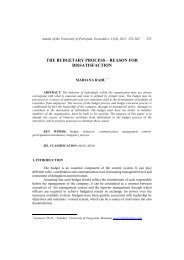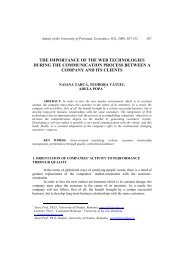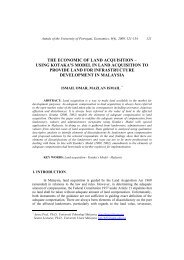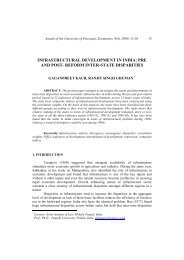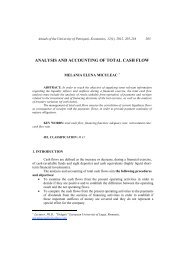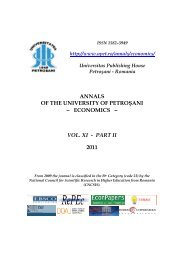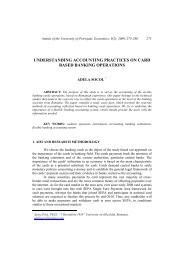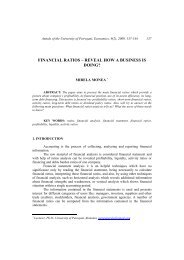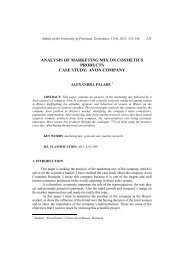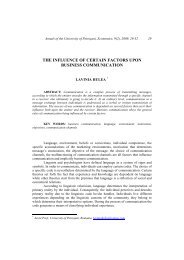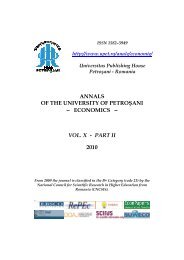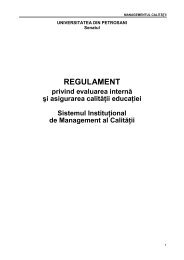annals of the university of petroÅani â¼ economics â¼ vol. xi - part i ...
annals of the university of petroÅani â¼ economics â¼ vol. xi - part i ...
annals of the university of petroÅani â¼ economics â¼ vol. xi - part i ...
You also want an ePaper? Increase the reach of your titles
YUMPU automatically turns print PDFs into web optimized ePapers that Google loves.
184 Niţă, D.; Fleşer, A.<br />
If one analyses <strong>the</strong> situation in Romania, it is noted that <strong>the</strong> percentage <strong>of</strong><br />
graduates <strong>of</strong> higher education has grown steadily since 2004. The same increasing<br />
trend has been registered at European level as well, our country retaining a significant<br />
distance from <strong>the</strong> EU average (EU-27, 32.3%; RO-16.8%). In spite <strong>of</strong> <strong>the</strong> upward<br />
trend, it is unlikely for Romania to reach target <strong>of</strong> 40% higher education graduates in<br />
2020.<br />
Until <strong>the</strong>y reach <strong>the</strong> phase when <strong>the</strong>y are considered to have a proper<br />
education, young people realize that <strong>the</strong> period <strong>of</strong> time necessary to find a job tends to<br />
increase, and thus <strong>the</strong>y are <strong>of</strong>ten discouraged; <strong>the</strong> lack <strong>of</strong> attractive choices along with<br />
<strong>the</strong> need to provide for <strong>the</strong>mselves and <strong>the</strong> financial resources required by educational<br />
systems, make youngsters accept temporary, low-quality and poorly paid jobs.<br />
3. EUROPEAN UNION CONCERNS REGARDING THE MANAGEMENT OF<br />
SPECIFIC PROBLEMS OF THE INSERTION OF YOUNG PEOPLE ON THE<br />
LABOUR MARKET<br />
Awareness <strong>of</strong> <strong>the</strong> importance <strong>of</strong> youngsters on <strong>the</strong> labour market and on <strong>the</strong><br />
development <strong>of</strong> national economies characterizes <strong>the</strong> Union's concerns. Based on <strong>the</strong><br />
specific characteristics <strong>of</strong> youth insertion on <strong>the</strong> labour market:<br />
- <strong>the</strong> direct relationship between education and employment (<strong>the</strong> higher <strong>the</strong><br />
education level, <strong>the</strong> lower <strong>the</strong> risk <strong>of</strong> unemployment); however a diploma no<br />
longer constitutes today an insurance against unemployment;<br />
- <strong>the</strong> trend <strong>of</strong> "brain drain", <strong>part</strong>icularly in <strong>the</strong> case <strong>of</strong> new Member States;<br />
- uncertainty in <strong>the</strong> workplace, low wages and overtime represents an obstacle in<br />
finding a balance between work and personal/family life;<br />
- <strong>the</strong> inefficiency <strong>of</strong> guidance and counselling services regarding career and <strong>the</strong><br />
education system adapted to <strong>the</strong> requirements <strong>of</strong> <strong>the</strong> labour market, do not solve<br />
<strong>the</strong> problem <strong>of</strong> young people;<br />
- insufficient exploitation <strong>of</strong> entrepreneurship among young people; etc.<br />
There must be noted that at <strong>the</strong> EU level <strong>the</strong>re e<strong>xi</strong>sts a package <strong>of</strong> measures for<br />
Member States aiming mainly (COM(2009) 200 final):<br />
- to ensure that <strong>the</strong> employment <strong>of</strong> young people remains a priority;<br />
- to promote job opportunities and training for young people across national borders;<br />
- to ensure that EU funds made available for encouraging <strong>the</strong> employment <strong>of</strong> young<br />
people, in <strong>part</strong>icular <strong>the</strong> social European fund, are used effectively;<br />
- to develop career guidance services and counselling;<br />
- to lift <strong>the</strong> barriers to enable free movement <strong>of</strong> workers throughout <strong>the</strong> EU;<br />
- to promote quality internships within education and training programmes and/or<br />
employment programmes;<br />
- to improve childcare facilities, so as to contribute to <strong>the</strong> reconciliation <strong>of</strong> work<br />
with <strong>the</strong> private lives <strong>of</strong> young adults.<br />
Obviously, <strong>the</strong> e<strong>xi</strong>stence <strong>of</strong> such measures is more than welcome, but not<br />
sufficient. In order to be really successful it is necessary that <strong>the</strong> EU effort be doubled<br />
by that <strong>of</strong> Member States which, in turn, should consider <strong>the</strong> implementation <strong>of</strong><br />
policies at national level. Fur<strong>the</strong>rmore, interbranch cooperation with local and regional



